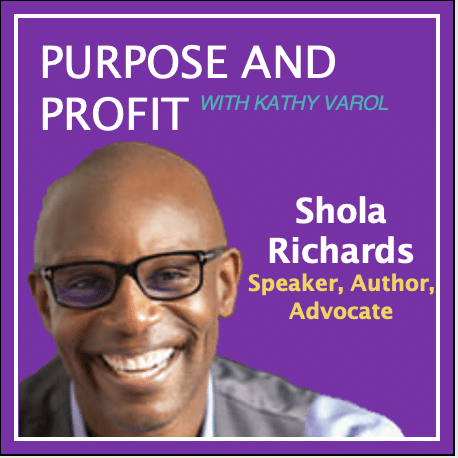Show Notes:
Shola Richards’ life’s mission is an ambitious one: To end generations of professional suffering, simply by changing how we treat each other at work. An advocate for positive change, Shola addresses the often-ignored issue of workplace bullying by highlighting its impact on trust, communication, and company resources. With a focus on unveiling the cost of toxic behaviors, Shola offers practical solutions for creating healthier work environments.
At his core, Shola is an advocate and humanitarian, guiding us back to our shared humanity. Shola shares his insights as a speaker, coach, consultant, and author. His work includes the best-selling books Go Together and Making Work Work, with a third booking coming out in late 2024.
I met Shola a year ago at an incredible NLP (Neuro-Linguistic Programming) workshop. I immediately gravitated toward his genuine warmth and openness. Shola is a remarkable human-being, making a huge impact.
In this episode we discuss:
✅ The transformative power of sharing mental health stories
✅ The importance of practicing civility in modern-day discourse
✅ The often-overlooked distinction between being nice and being kind
3 episode takeaways (listen to the full episode for a lot more gems!):
1️⃣ Embracing Ubuntu: “I Am Because We Are”. Imagine a world where we live by the profound ethos of ubuntu, an African philosophy that teaches, “I am because we are.” This philosophy illuminates our inherent interconnectedness. It suggests that our humanity is inextricably linked to the humanity of others, and that our personal well-being is anchored in the collective well-being of society.
Shola’s exploration of ubuntu in Go Together suggests that adopting this worldview could revolutionize our approach to life, work, and leadership. Ultimately, transforming the world around us.
***
2️⃣ Cultivating Culture: A Collective Responsibility. We are all collectively responsible for the culture we live in, the culture we work in, and the culture we’re passing down to the next generation.
Simply put, culture is just a collection of the norms we accept, or no longer accept. Culture is powerful because it permeates everything. Seeping into how we behave, how we view the world, and how we view ourselves. What we have compassion for and what we judge.
What cultural norms don’t feel right to you? When have you felt like you had to “play the game” when your insides were boiling or crumbling? What if, next time you felt that way, you took a deep breath and said “That didn’t sit well with me. Can you please explain what you meant?”. This could invite a courageous dialogue – that one dialogue at a time – might help pave the road to a better culture.
* * *
3️⃣ Protecting the Heart of the Workplace: Listening to the Empaths. In environments that feel cold and disconnected, those most in touch with their humanity—the empaths—feel the impact most sharply. They are the canary in the coal mine, alerting us to psychological hazards that lurk within toxic cultures.
For leaders, the call to action is clear: listen and respond. Ignoring toxic behaviors erodes morale, diminishes trust in leadership, and questions the organizational commitment to employee well-being. Remember, your employees are building your company’s future. Their success is your success. As leaders, it’s your job to foster a nurturing environment where every team member can thrive, innovate, and excel.
References:
- Keep an eye out for Shola’s next book due out September 2024
- Civil Unity: The Radical Path to Transform Our Discourse, Our Lives, and Our World

